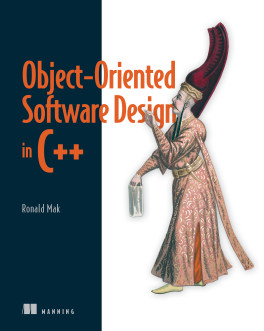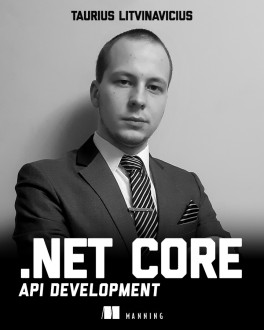pro $24.99 per month
- access to all Manning books, MEAPs, liveVideos, liveProjects, and audiobooks!
- choose one free eBook per month to keep
- exclusive 50% discount on all purchases
lite $19.99 per month
- access to all Manning books, including MEAPs!
team
5, 10 or 20 seats+ for your team - learn more

Look inside
Eliminate the unavoidable complexity of object-oriented designs. The innovative data-oriented programming paradigm makes your systems less complex by making it simpler to access and manipulate data.
In Data-Oriented Programming you will learn how to:
Data-Oriented Programming is a one-of-a-kind guide that introduces the data-oriented paradigm. This groundbreaking approach represents data with generic immutable data structures. It simplifies state management, eases concurrency, and does away with the common problems you’ll find in object-oriented code. The book presents powerful new ideas through conversations, code snippets, and diagrams that help you quickly grok what’s great about DOP. Best of all, the paradigm is language-agnostic—you’ll learn to write DOP code that can be implemented in JavaScript, Ruby, Python, Clojure, and also in traditional OO languages like Java or C#.
In Data-Oriented Programming you will learn how to:
- Separate code from data
- Represent data with generic data structures
- Manipulate data with general-purpose functions
- Manage state without mutating data
- Control concurrency in highly scalable systems
- Write data-oriented unit tests
- Specify the shape of your data
- Benefit from polymorphism without objects
- Debug programs without a debugger
Data-Oriented Programming is a one-of-a-kind guide that introduces the data-oriented paradigm. This groundbreaking approach represents data with generic immutable data structures. It simplifies state management, eases concurrency, and does away with the common problems you’ll find in object-oriented code. The book presents powerful new ideas through conversations, code snippets, and diagrams that help you quickly grok what’s great about DOP. Best of all, the paradigm is language-agnostic—you’ll learn to write DOP code that can be implemented in JavaScript, Ruby, Python, Clojure, and also in traditional OO languages like Java or C#.
about the technology
Code that combines behavior and data, as is common in object-oriented designs, can introduce almost unmanageable complexity for state management. The Data-oriented programming (DOP) paradigm simplifies state management by holding application data in immutable generic data structures and then performing calculations using non-mutating general-purpose functions. Your applications are free of state-related bugs and your code is easier to understand and maintain.about the book
Data-Oriented Programming teaches you to design software using the groundbreaking data-oriented paradigm. You’ll put DOP into action to design data models for business entities and implement a library management system that manages state without data mutation. The numerous diagrams, intuitive mind maps, and a unique conversational approach all help you get your head around these exciting new ideas. Every chapter has a lightbulb moment that will change the way you think about programming.what's inside
- Separate code from data
- Represent data with generic data structures
- Manage state without mutating data
- Control concurrency in highly scalable systems
- Write data-oriented unit tests
- Specify the shape of your data
about the reader
For programmers who have experience with a high-level programming language like JavaScript, Java, Python, C#, Clojure, or Ruby.Reach the next level of enlightenment…Reduce accidental complexity and raise the level of abstraction.
After I saw the examples, I couldn’t unsee it. I didn’t need a new language; I needed to approach programming differently!
If you have to deal with data in your code, you should know about DOP!
The principles are straightforward and universally applicable.
choose your plan
team
monthly
annual
$49.99
$399.99
only $33.33 per month
- five seats for your team
- access to all Manning books, MEAPs, liveVideos, liveProjects, and audiobooks!
- choose another free product every time you renew
- choose twelve free products per year
- exclusive 50% discount on all purchases
-
![]() Data-Oriented Programming ebook for free
Data-Oriented Programming ebook for free
choose your plan
team
monthly
annual
$49.99
$399.99
only $33.33 per month
- five seats for your team
- access to all Manning books, MEAPs, liveVideos, liveProjects, and audiobooks!
- choose another free product every time you renew
- choose twelve free products per year
- exclusive 50% discount on all purchases
-
![]() Data-Oriented Programming ebook for free
Data-Oriented Programming ebook for free
choose your plan
team
monthly
annual
$49.99
$399.99
only $33.33 per month
- five seats for your team
- access to all Manning books, MEAPs, liveVideos, liveProjects, and audiobooks!
- choose another free product every time you renew
- choose twelve free products per year
- exclusive 50% discount on all purchases
-
![]() Data-Oriented Programming ebook for free
Data-Oriented Programming ebook for free

















 Data-Oriented Programming ebook for free
Data-Oriented Programming ebook for free